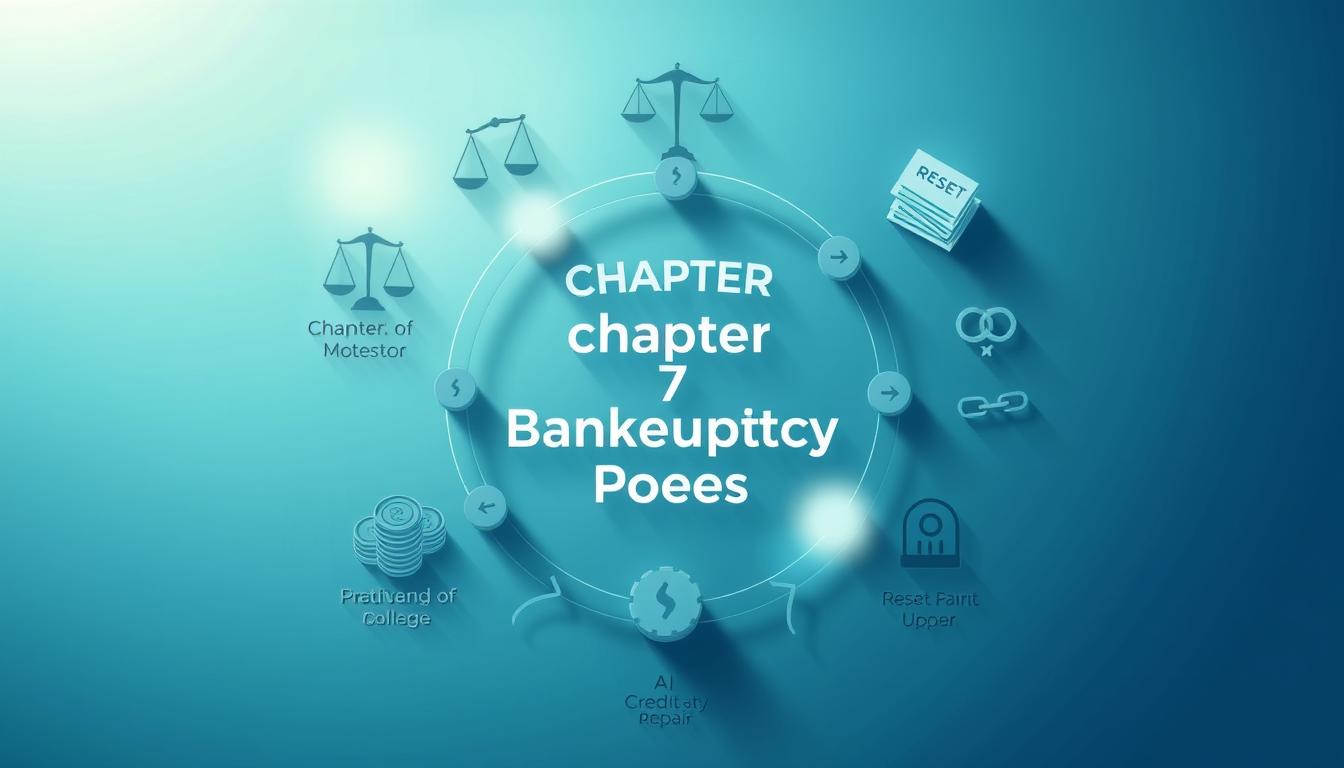Chapter 7 bankruptcy offers legal protection for those drowning in debt. It provides a fresh start but affects your credit score. Let’s explore how Chapter 7 impacts your creditworthiness and ways to rebuild.
We’ll look at the immediate and long-term effects on your credit. We’ll also discuss strategies to improve your score after bankruptcy.
Key Takeaways
- Chapter 7 bankruptcy can have a severe and immediate negative impact on your credit score, often leading to a significant drop.
- The effects of Chapter 7 bankruptcy can linger on your credit report for up to 10 years, making it challenging to obtain new credit or loans during this time.
- Developing a well-planned credit repair strategy, including the use of secured credit cards and responsible credit usage, can help you rebuild your credit score over time.
- Monitoring your credit reports regularly and addressing any errors or discrepancies can aid in the credit recovery process.
- Maintaining a disciplined approach to personal finance and avoiding future debt issues is crucial for long-term financial stability after bankruptcy.
What is Chapter 7 Bankruptcy?
Chapter 7 bankruptcy is a legal process that helps people clear their eligible debts. It’s the most common type of bankruptcy in the United States. This option offers a fresh financial start for those drowning in debt.
Understanding the Basics
In Chapter 7 bankruptcy, a court-appointed trustee sells the person’s non-exempt assets. The money from these sales goes towards paying off as much debt as possible. The trustee manages this process and distributes funds to creditors.
Chapter 7 bankruptcy can help eliminate many unsecured debts. These include credit card balances, medical bills, and personal loans. However, some debts like child support and student loans usually can’t be discharged.
Qualifying for Chapter 7
To file for Chapter 7 bankruptcy, individuals must pass a means test. This test looks at their income and expenses. It determines if they have enough money left over to repay some debts.
People may qualify if their income is below their state’s median level. Other eligibility criteria also apply. The qualifying for chapter 7 bankruptcy process can be tricky.
It’s wise to talk to a bankruptcy attorney before filing. They can explain your options and potential consequences clearly.

“Chapter 7 bankruptcy is a powerful tool for individuals struggling with overwhelming debt, but it’s important to understand the process and its implications before making the decision to file.”
How Does Chapter 7 Affect Your Credit Score?
Chapter 7 bankruptcy can significantly impact your credit score. It can have immediate and long-term effects on your creditworthiness. Understanding these effects is crucial as you navigate the bankruptcy process.
Chapter 7 bankruptcy adds a negative entry to your credit report. This entry can stay for up to 10 years. It may limit your ability to get new credit, loans, or rental housing.
The how does chapter 7 affect credit score and impact of chapter 7 on credit score are linked to this public record. Chapter 7 can also lead to the discharge of various debts. This includes credit card balances, personal loans, and medical bills.
Debt elimination may provide immediate relief. However, it can also cause a significant drop in your credit score. Lenders see discharged debts as a sign of increased financial risk.
| Metric | Impact of Chapter 7 Bankruptcy |
|---|---|
| Credit Score | Significant decrease, typically ranging from 130 to 240 points |
| Credit Report | Bankruptcy filing remains for up to 10 years |
| Debt Discharge | Eliminated debts can lead to a decrease in Credit Score |
| Future Credit Eligibility | Decreased likelihood of obtaining new credit, loans, or rental housing |
The long-term impact of Chapter 7 bankruptcy can vary. It depends on your financial situation and efforts to rebuild credit. With dedication and responsible management, you can gradually improve your credit score over time.

Credit Score After Chapter 7: The Impact
Filing for Chapter 7 bankruptcy significantly affects your credit score. The impact is immediate and long-lasting. However, there’s hope for rebuilding your creditworthiness over time.
Immediate Effects on Credit Score
Chapter 7 bankruptcy causes a dramatic drop in your credit score. You can expect a decrease of 100-200 points or more. This steep decline occurs because the bankruptcy becomes a public record on your credit report.
Lenders see this as a sign that you’ve defaulted on financial obligations. It signals a higher risk for future credit.
Long-term Credit Score Recovery
The negative impact of Chapter 7 bankruptcy can last up to 10 years. But don’t lose heart. You can start rebuilding your credit right away.
With consistent financial responsibility, you’ll see gradual improvements. Strategic credit-building efforts will help boost your creditworthiness over time.
| Metric | Impact on Credit Score |
|---|---|
| Immediate Impact | 100-200 point decrease |
| Long-term Recovery | Up to 10 years |
Grasping the immediate and long-term effects of bankruptcy prepares you for the journey ahead. You can take steps to rebuild your financial well-being. Remember, recovery is possible with patience and smart financial choices.

Rebuilding Your Credit After Bankruptcy
Rebuilding credit after Chapter 7 bankruptcy can be challenging. But with the right approach, you can regain creditworthiness. Let’s look at effective ways to rebuild your credit.
Strategies for Credit Repair
Getting a secured credit card is a key step. These cards need a refundable deposit, which becomes your credit limit. Timely payments on a secured card help establish positive credit history.
Becoming an authorized user on someone’s credit card is another option. This can boost your credit score. Choose someone with good credit who’s willing to add you.
- Apply for a secured credit card
- Become an authorized user on someone else’s credit card
- Maintain a budget and make all payments on time
- Monitor your credit reports regularly and dispute any errors
- Limit hard credit inquiries by only applying for credit when necessary
Make on-time payments consistently. Keep a low credit utilization ratio. Monitor your credit reports regularly. These actions are crucial for rebuilding credit after bankruptcy.

Credit recovery takes time, but don’t lose hope. Follow these proven strategies to rebuild your credit after bankruptcy. With patience, you can achieve your financial goals.
credit score after chapter 7
Filing for Chapter 7 bankruptcy greatly impacts your credit score. The recovery process offers hope for those taking proactive steps. Understanding this impact is key to rebuilding your financial future.
After Chapter 7, credit scores typically fall between 500-600. This drop occurs because bankruptcy stays on your credit report for 10 years. However, individual scores can vary based on personal circumstances.
- Individuals with a higher pre-bankruptcy credit score may experience a more significant drop, potentially falling into the 400-500 range.
- Those with a lower pre-bankruptcy credit score may see a less drastic decline, with scores in the 500-600 range being more common.
Lenders consider more than just credit scores. They also look at payment history, debt-to-income ratio, and credit utilization. These factors help determine creditworthiness and interest rates.
Rebuilding credit after Chapter 7 is possible with effort. By addressing key factors, individuals can restore their creditworthiness over time. Patience and discipline are crucial for credit score recovery after Chapter 7.
Monitoring Your Credit Reports
After filing for Chapter 7 bankruptcy, keep a close eye on your credit reports. This ensures accurate information and helps spot potential errors from the bankruptcy process.
Checking your credit after bankruptcy is crucial. It helps verify the accuracy of your bankruptcy filing on credit reports.
It also confirms that discharged debts are properly reflected. Additionally, it helps identify any new accounts or inquiries that might be fraudulent.
- Ensuring the bankruptcy filing is accurately reported on your credit reports
- Verifying that any debts included in the bankruptcy are properly reflected as discharged or closed
- Identifying any new credit accounts or inquiries that may be the result of identity theft or errors
Monitoring your credit reports allows for quick action on any issues. This can prevent further damage to your credit score and help rebuild it faster.
Regular credit monitoring is vital for financial recovery after bankruptcy. It helps you regain control of your credit situation.
By addressing concerns promptly, you can build a stronger financial future. Stay vigilant and take charge of your credit journey.
The Importance of Responsible Credit Usage
After Chapter 7 bankruptcy, responsible credit usage is key to avoiding future debt issues. It’s vital for rebuilding your credit score and financial stability. A mindful approach to managing credit will help prevent falling back into debt.
Avoiding Future Debt Issues
To prevent debt problems after bankruptcy, try these strategies:
- Develop a budget and stick to it: Carefully track your income and expenses to ensure you don’t overextend your finances.
- Use credit cards responsibly: Limit your credit card usage and make timely payments to demonstrate responsible credit behavior.
- Avoid impulse purchases: Before making a purchase, ask yourself if it’s a necessity or a want, and consider the long-term financial implications.
- Build an emergency fund: Set aside a portion of your income each month to create a financial cushion for unexpected expenses.
- Seek professional guidance: Consider working with a financial advisor or credit counselor to develop a personalized plan for managing your finances.
These practices can safeguard your financial well-being after Chapter 7 bankruptcy. They pave the way for a brighter financial future. Embracing them helps you regain control of your finances.
Responsible credit usage is about rebuilding your financial strength and confidence. It takes discipline and dedication. With these qualities, you can regain control of your financial life. You’ll be able to move forward positively.
Success Stories: Bouncing Back from Bankruptcy
Chapter 7 bankruptcy can be tough, but real-life stories show it’s possible to rebuild credit. These tales offer hope and useful tips for those recovering from financial challenges.
Emily, a Los Angeles business owner, faced a tough choice. “Bankruptcy was hard, but it gave me a fresh start,” she said. Emily worked hard to manage her credit wisely.
Within a few years, her credit score improved greatly. Now, she owns a home and runs a successful business. Her story shows how dedication can lead to financial recovery.
Michael, a Chicago marketing pro, also faced hurdles. He stayed patient and focused on building good credit. I started with a secured credit card,” Michael explained.
He made sure to pay on time, every time. His credit score slowly improved. Soon, he qualified for a regular credit card and a car loan.
Michael’s advice? “Stay disciplined and never give up.” His story proves that with effort, financial recovery is possible.

